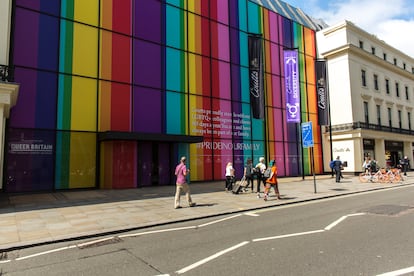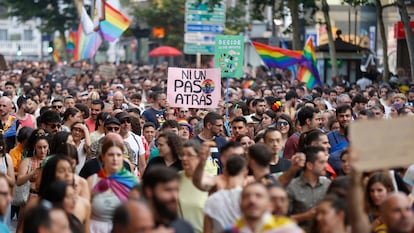‘Pinkwashing is on its way to becoming a brave gesture’: When the harassment of Zara and Bud Light campaigns puts brands in jeopardy
With the removal of the symbol from dozens of city halls, the much-criticized commercial use of the Pride flag has changed its connotation in a hostile environment of harassment and the rise of the far-right

With a brief animation showing different balloons in the colors of the rainbow that, at the end, form the words ‘Love and Pride,’ Zara congratulated the LGBTQI+ community on the occasion of its international day on Instagram on June 28. An innocuous post at best, with no message, no protest, or representational component that could challenge anyone, was quickly overwhelmed by a cataract of angry reactions, illustrating how, these days, no show of support for the cause is seen as superficial. “Show respect for your customers. We are not obliged to support this movement,” wrote one user, accompanied by dozens of messages announcing that they were no longer following the brand (vomit emojis included), and religious invocations: “The rainbow is God’s promise not to flood the Earth again, stop selling it as something different from what it really means.” ICON has contacted Zara but has not received a response.
A few years ago it was commonly assumed to be pinkwashing. That is, harmless gestures — marketing via symbols — by companies with no greater commitment than appealing to the succulent niche market embodied by the community, in much the same way as they do with women around March 8 (International Women’s Day). Now, however, it has become a gesture that is fraught with risk. The use of the flag by a large chain used to be understood, from the activist point of view, as a way to strip it of meaning and depoliticize its struggle: even Donald Trump sold merchandising from his official website in 2019(currently withdrawn) with the slogan ‘Make America Great Again’ in multicolor format so that his followers could “show support for the LGBT community and the 45th president.” Now, probably contrary to what these large chains would like, the extreme right’s targeting of the symbol has reactivated its political message and the perception of the flag as an icon of protest. While a multitude of municipal governments in Spain, led by the PP (conservatives) are taking down the rainbow drapery from the town halls, or avoiding putting it up, and Vox (far-right) displayed a building wrap (already removed) in the center of Madrid, with an image of the LGBTQI+ flag being thrown into the trash, storefronts are emblazoned with the the Pride colours and, by association, the brands also become the target of intolerant fanatics.
In an article in The Guardian, journalist Matthew Candor observed the changing behavior of some brands in the United States in the wake of backlash, boycott campaigns and, in general, public opinion’s creep towards the right-wing. “Pride month served as an opportunity for global brands to demonstrate their inclusivity (...) for marketing purposes, without expending political or financial capital to stand by persecuted queer people around the world. But the political environment in the U.S. is shifting,” he writes. The context he was referring to is that of Republican anti-trans or anti-drag laws, a seething cauldron that caused Bud Light brewery’s merest networking collaboration with tiktoker Dylan Mulvaney (a trans woman), to take on the status of a national psychodrama, with the parent company suspending executives in the wake of far-right attacks on the brand. In Florida, the passing of the ‘Don’t Say Gay’ bill sparked a clash (and a fiscal vendetta) between Governor Ron DeSantis and Disneyworld, after its workers forced the company to speak out against Republican censorship of all content related to sexual orientation and gender identity in schools.
Far from the virulent debate in the United States, last Christmas the whiskey brand JB surprised everyone with an ad in Spain that showed a grandfather learning to put on makeup to encourage his trans granddaughter to come out of the closet. Apart from criticism from the far right and so-called trans-exclusionary radical feminists, the ad was generally well received. “The situation is making us appreciate that what we used to consider pinkwashing is on its way to becoming a courageous gesture, however ridiculous it may be,” said Fernando de Córdoba, brand, content, and narrative strategist, when consulted by ICON. “A lot of brands would put up the rainbow flag at Pride just like they would put out the Halloween pumpkin in October or the little Christmas trees in December. Now, with the rise of hate and intolerance, brands have an opportunity to show that they are consistent and truly do care, and that it is not performative support.”
“Close on exit”
With nearly 50,000 followers, Benidorm Tourism’s Instagram profile attracts the attention of both tourists to the city and enthusiasts of its architecture. On June 28, also coinciding with Pride Day (that is, with the commemoration of the 1969 Stonewall riots), a series of images of gay and lesbian couples visiting the town was published with a text that included phrases such as “wherever you come from, whoever you are, whoever you love, you will always have a home in Benidorm.” Those responsible, in this case, did choose to respond from the official account to several of the offended and aggrieved messages with both humor and determination. “I’ll stop following you!” one exclaims. “Thank you! Don’t forget to close the door on your way out,” says Benidorm Tourism. “Are you OK?” they ask another who wrote “What the fuck is this?”
“We are involved in collective action, and we post all year round, not just during Pride month,” Lucho, head of content creation at Visit Benidorm and the publication’s author explains to ICON. “Benidorm has been known for its free, tolerant, and cosmopolitan spirit since the dark days of the dictatorship. As a matter of fact, the first gay bar in Spain opened here.” “‘Pinkwashing’ or ‘pink money’ has always had a negative connotation, with every business hanging out the little Pride flag. But in this strange time we are living in of hatred, fake news and calling communities chiringuitos [a disrespectful term for small, unofficial businesses], the more companies join in and show the flag, the better, although it may seem opportunistic,” he says. “Any visibility is good: the flag on brands, at destinations or in town halls also indicates that these are safe places for the community. What some see as a logo, others see as safety and freedom.”
Commitment is put to the test
“It’s all very well for companies to have greater responsibility and awareness of diversity, but there must also be coherence in their own structures,” journalist and sustainability researcher Brenda Chávez, author of the book Al borde de un ataque de compras (availabe only in Spanish), told ICON. “It is not right to boast about inclusion when this does not correspond to internal promotion, labor, or professional plans. It must go outward and inward.” In 2020, Starbucks found itself embroiled in controversy following an ad starring a trans man. Former trans employees accused the company of “hypocrisy” after suffering intentional misgendering in the workplace, difficulties in using the name they identified with, or breaches of the medical coverage Starbucks committed to.

It has also been the case with Disney: before a one-and-a-half-second lesbian kiss in Lightyear (2022) led conservative parents around the world to cry foul, or the screening of the children’s film Strange World (2022), featuring a homosexual character, prompted an investigation against a teacher at a Florida school. In addition, artists such as Alex Hirsch (creator of the Gravity Falls cartoon series) and Dana Terrace (The Owl House) questioned the authenticity of the company’s promotional and protest actions, such as putting the rainbow flag on its social networks for Pride month. “Disney in public: ‘We’ve put a rainbow sticker on Lightning McQueen today. Teenagers, buy our products!’ Disney in private: ‘Cut that gay scene! We could lose valuable pennies from Russia and China!” tweeted Hirsch in 2021. He also leaked several emails with the Standards and Practices department’s concerns. The company, however, has made a turnaround in its policies and has recently refused to remove scenes with LGBTQI+ representation in Strange World itself and some Marvel releases, among others, in countries such as China that required it to do so in order to release its productions.
Journalist Paola Aragón Pérez, who specializes in feminist political communication, has reservations about the benefits of pinkwashing. “Apart from the context in which we move, I don’t think they are brave campaigns, because they reproduce slogans like ‘Love is love’, ‘Love who you love’... that don’t generate any kind of conflict,” she tells ICON. “They are slogans more typical of the eighties or nineties, appeals to romantic love that extrapolate the heterosexual institution to other subjects, without questioning it or the traditional family model.” A model that favors consumption and that, by its own logic, “does not question the pillars on which systems of oppression such as patriarchy, racism or capitalism rest, in a deeper sense than kissing the person you love.”
“In addition, the campaigns and signs are placed in the areas where Pride is held, such as the Chueca neighborhood in Madrid, not in places where it could pose a problem,” notes Aragón. The fact that the overreactions of the ultra-right may have more to do with a plan to shift general opinion, in line with the Overton Window thesis — very succinctly, the margin of what is perceived as tolerable by the majority in a society according to public discourse; which can be moved, in this case, by manufacturing polemics so that cosmetic gestures are considered radical — is no reason, the journalist argues, to buy that “pinkwashing actions are revolutionary.”

In the United States, the clothing company Target withdrew part of its LGBTQI+ collection last May after several ultra-right attacks, fueled by the hoax that it included clothing specifically designed for trans minors. Brand strategist Fernando de Córdoba advocates an effective deepening of companies in “diversity, both at the orientation and identity level,” rather than “cowering in the face of extremist voices.” Prada, Kering, LVMH and Inditex, while leaving aside many other possible considerations about their production policies, have launched various initiatives officially aimed at improving inclusion. “Pride is not only in June. There is a lot that companies can do year-round, such as tackling bias, giving internal training, or improving their HR policies. That’s when a brand proves to be real and consistent,” explains De Córdoba. “Principles are principles when they cost you money.”
Sign up for our weekly newsletter to get more English-language news coverage from EL PAÍS USA Edition
Tu suscripción se está usando en otro dispositivo
¿Quieres añadir otro usuario a tu suscripción?
Si continúas leyendo en este dispositivo, no se podrá leer en el otro.
FlechaTu suscripción se está usando en otro dispositivo y solo puedes acceder a EL PAÍS desde un dispositivo a la vez.
Si quieres compartir tu cuenta, cambia tu suscripción a la modalidad Premium, así podrás añadir otro usuario. Cada uno accederá con su propia cuenta de email, lo que os permitirá personalizar vuestra experiencia en EL PAÍS.
¿Tienes una suscripción de empresa? Accede aquí para contratar más cuentas.
En el caso de no saber quién está usando tu cuenta, te recomendamos cambiar tu contraseña aquí.
Si decides continuar compartiendo tu cuenta, este mensaje se mostrará en tu dispositivo y en el de la otra persona que está usando tu cuenta de forma indefinida, afectando a tu experiencia de lectura. Puedes consultar aquí los términos y condiciones de la suscripción digital.








































